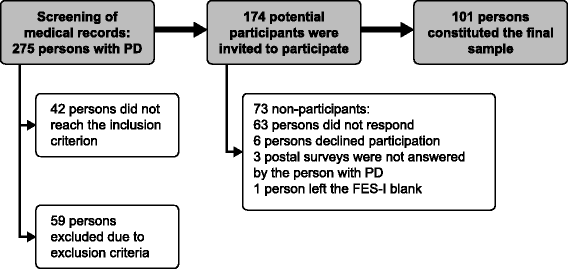Psychometric properties of the original and short versions of the Falls Efficacy Scale-International (FES-I) in people with Parkinson's disease
- PMID: 28569162
- PMCID: PMC5452359
- DOI: 10.1186/s12955-017-0689-6
Psychometric properties of the original and short versions of the Falls Efficacy Scale-International (FES-I) in people with Parkinson's disease
Abstract
Background: Fear of falling is common in people with Parkinson's disease (PD) and is associated with an increased risk for future falls, activity limitations and a reduced quality of life. The Falls Efficacy Scale-International (FES-I) assesses fear of falling conceptualized as concerns about falling. The original FES-I has good psychometric properties in people with PD, but whether this applies also for the short version of FES-I remains to be shown. The aim of the present study was to evaluate the psychometric properties of the short FES-I and to compare these with the original FES-I in the same sample of people with PD. The investigated psychometric properties included known groups validity, data completeness, scaling assumptions, targeting and reliability.
Methods: A postal survey, which included the original, full-length FES-I, was distributed to 174 people with PD. Responders received a second survey after two weeks. From these data, short FES-I total scores were calculated by extracting the items that are included in the short version of the scale.
Results: Median age and PD duration of the 101 responders (43% women) were 73 and 5 years, respectively. The original as well as the short FES-I scores were able to discriminate (p < 0.001) between groups with and without fear of falling, activity avoidance, falls, near falls, and with various self-rated PD severity, respectively. Both versions of FES-I had a high level of data completeness (0.7 to 0.9% missing item responses). Scaling assumptions were acceptable for the original as well as the short FES-I. While the short FES-I had 19% floor effect, the original version was better targeted. Both versions were reliable and obtained high values for internal consistency (Cronbach's alpha >0.8) and test-retest reliability (Intraclass Correlation Coefficient > 0.9).
Conclusions: Both the original and short FES-I revealed generally good psychometric properties in people with PD, although the original scale was better targeted. Due to the higher floor effect in the short FES-I, the present findings favors using the original, full-length FES-I in longitudinal follow-ups, intervention studies and clinical practice when addressing concerns about falling.
Keywords: Concerns about falling; Parkinson disease; Psychometrics; Reliability of results.
Figures
References
Publication types
MeSH terms
LinkOut - more resources
Full Text Sources
Other Literature Sources
Medical
Miscellaneous


